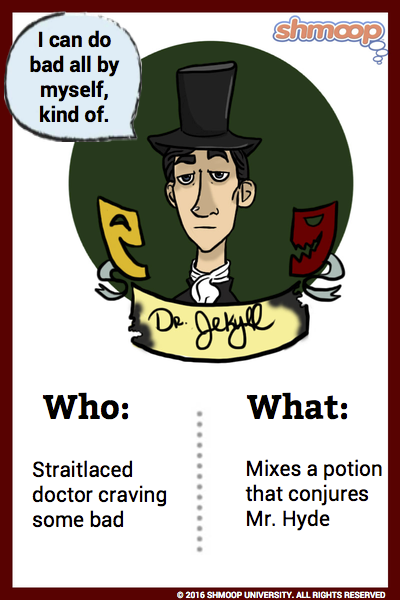Character Analysis

(Click the character infographic to download.)
No More Mr. Nice Guy
Dr. Jekyll is a good guy who plays by the rules. He reads books about religion, he does charity work, and he throws dinner parties for his bachelor friends—and though the phrase "bachelor party" conjures up images of Vegas and debauchery, the focus of these parties is science, religion, and literature (*stifled yawn*).
Dr. Jekyll eats his greens. He flosses daily. He makes his bed first thing in the morning. He never leaves his wet towels on the floor. And all this goodness is making him crawl out of his dang skin.
But Dr. Jekyll does have one nasty little secret: he longs to be evil and give way to many unspecified "appetites." His name perhaps provides a clue: "Je" in French means "I," while "kyll" = kill. The question is, what or whom does he kill? Himself? His appetites? His good side? His evil side?
After contemplating and analyzing these appetites of his, Dr. Jekyll decides that all men are both good and evil, and the clear thing to do is to try separating these two opposing facets:
It was on the moral side, and in my own person, that I learned to recognise the thorough and primitive duality of man; I saw that, of the two natures that contended in the field of my consciousness, even if I could rightly be said to be either, it was only because I was radically both; and from an early date, even before the course of my scientific discoveries had begun to suggest the most naked possibility of such a miracle, I had learned to dwell with pleasure, as a beloved daydream, on the thought of the separation of these elements. If each, I told myself, could be housed in separate identities, life would be relieved of all that was unbearable; the unjust might go his way, delivered from the aspirations and remorse of his more upright twin; and the just could walk steadfastly and securely on his upward path, doing the good things in which he found his pleasure, and no longer exposed to disgrace and penitence by the hands of this extraneous evil. It was the curse of mankind that these incongruous faggots were thus bound together—that in the agonised womb of consciousness, these polar twins should continuously be struggling. How, then, were they dissociated? (10.1)
Dr. Jekyll—who is apparently a scientist as well as a doctor—experiments with a variety of potions with this goal in mind. He eventually mixes a potion that, when consumed, turns him into Mr. Hyde. He morphs into another person entirely—an evil person:
The most racking pangs succeeded: a grinding in the bones, deadly nausea, and a horror of the spirit that cannot be exceeded at the hour of birth or death. Then these agonies began swiftly to subside, and I came to myself as if out of a great sickness. There was something strange in my sensations, something indescribably new and, from its very novelty, incredibly sweet. I felt younger, lighter, happier in body; within I was conscious of a heady recklessness, a current of disordered sensual images running like a millrace in my fancy, a solution of the bonds of obligation, an unknown but not an innocent freedom of the soul. I knew myself, at the first breath of this new life, to be more wicked, tenfold more wicked, sold a slave to my original evil; and the thought, in that moment, braced and delighted me like wine. I stretched out my hands, exulting in the freshness of these sensations; and in the act, I was suddenly aware that I had lost in stature. (10.4)
It’s important to note that Dr. Jekyll has a conscience. He knows what he’s doing is bad. He even admits that as Dr. Jekyll, he sometimes works to fix the harm that he caused as Mr. Hyde. But eventually, he just can’t help himself. He has to participate in a world of pleasure no matter what it costs him.
Dr. Henry Jekyll's Timeline